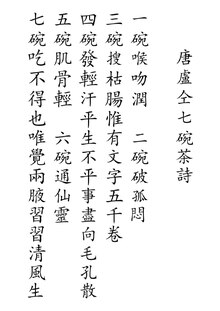Chinese writer
 Lu Tong's Seven Bowls of Tea, traditional Chinese characters
Lu Tong's Seven Bowls of Tea, traditional Chinese characters
Lu Tong (pinyin: Lú Tóng; Wade–Giles: Lu T'ung; simplified Chinese: 卢仝; traditional Chinese: 盧仝; 790–835), pseudonym Yuchuanzi (Chinese: 玉川子), was a Chinese poet of the Tang dynasty, known for his lifelong study of Chinese tea culture. He never became an official, and is better known for his love of tea than his poetry.[1][2]
Biography
Lu Tong, also called by the self-ascribed art name Yuchuanzi, was from the city of Jiyuan in the Chinese province of Henan.
Poetry
Lu Tong's Seven Bowls of Tea (七碗诗 卢仝(唐. 790~835)):
The first bowl moistens my lips and throat; 一碗喉吻潤,
The second bowl breaks my loneliness; 二碗破孤悶,
The third bowl searches my barren entrails but to find 三碗搜枯腸,
Therein some five thousand scrolls; 惟有文字五千卷,
The fourth bowl raises a slight perspiration 四碗發輕汗,
And all life's inequities pass out through my pores; 平生不平事盡向毛孔散,
The fifth bowl purifies my flesh and bones; 五碗肌骨清,
The sixth bowl calls me to the immortals. 六碗通仙靈,
The seventh bowl could not be drunk, 七碗吃不得也,
only the breath of the cool wind raises in my sleeves. 唯覺兩腋習習清風生。
Where is Penglai Island, Yuchuanzi wishes to ride on this sweet breeze and go back. 蓬萊山﹐在何處,玉川子乘此清風欲歸去。
(Steven R. Jones 2008)[4]
Penglai Island, or Mount Penglai, is a mythologic island where the immortals lived.
See also
References
Works cited
- “Chinese-English Tea Studies Terminology”, (2010), Lu-Yu Tea Culture Institute, Co., Ltd, ISBN 978-957-9690-06-5
- Lu Tong poem
- The Seven Cups of Tea, in English and Chinese
- Ueki, Hisayuki; Uno, Naoto; Matsubara, Akira (1999). "Shijin to Shi no Shōgai (Ro Dō)". In Matsuura, Tomohisa (ed.). Kanshi no Jiten 漢詩の事典 (in Japanese). Tokyo: Taishūkan Shoten. p. 120. OCLC 41025662.
External links

